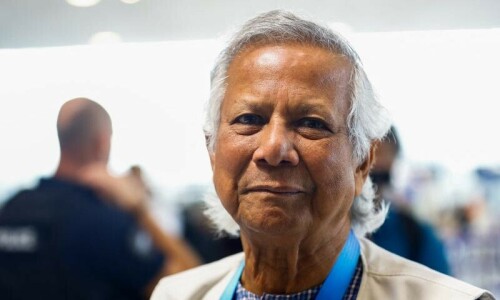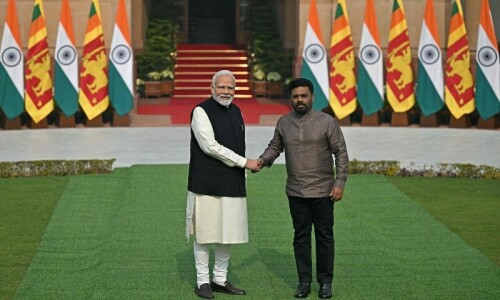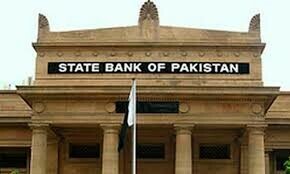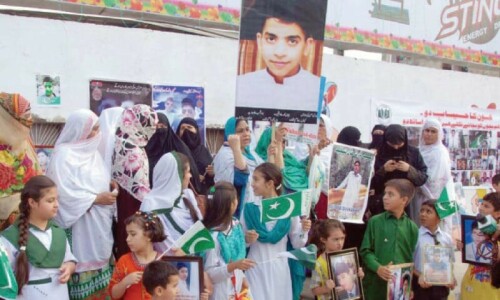IT makes sense to say that one form of political excess breeds another. Imran Khan should have known that he was trying the patience of the government with his demagoguery and a breaking point was bound to be reached.
He has only himself to blame for the non-bailable warrants of arrest issued by the anti-terrorism court against him and his top leadership. Whether or not the charges are justified is a matter for the court to decide.
Convinced he had been done out of the country’s highest post as a result of a rigged election, Imran Khan has, for three months, been demanding change.
Besides the resignation of the prime minister, Khan has sought electoral reforms, the instituting of a judicial commission to investigate the validity of the last elections and the holding of mid-term polls.
He has also been fulminating on the issue of the people’s rights: from potable water to universal education. He has, in short, been calling for systemic change.
A deeper critique of society is called for.
Khan is seen by some as staging a form of intervention not unlike that witnessed when Bhutto launched his People’s Party. However, there is a great difference between the strident cricketer-politician and the iconic PPP leader.
With his perfect ear for history, Bhutto spearheaded a mass movement against a largely discredited military regime. Socialism was the slogan of the hour.
There was a kind of soft revolution which led to the empowerment of the urban working class. A new, albeit troubled, Pakistan was born.
Imran Khan is clearly a man of commitment. What he and Dr Qadri have been saying makes sense. But, unfortunately, it also lacks depth.
It does not add up to what we think of as historical necessity. No number of tidy formulas for change can really be said to hold good for Pakistan of today. They come across at best as something of a red herring, driven by a questionable agenda.
The implicit allegation — that democracy in Pakistan has failed to deliver — is baseless. Democracy has been made to rein itself in.
A deeper critique of society is called for. This is a time for fundamental questions rather than simplistic pronouncements.
There are important choices to be made. It is crucial to think contextually. Also, we must ensure that we are able to see the wood for the trees.
The question that looms large right now is, of course, that of domestic security. It is a question that neither Imran Khan nor Dr Qadri seems seriously interested in addressing. Nevertheless, it is of the essence. Bomb blasts persist with no less virulence than before.
The recent incidents in Quetta and Lahore were a sobering reminder of what we, in any case, know but can apparently do little about. It has been pointed out that, while Zarb-i- Azb may be proving effective in North Waziristan, this operation in the tribal area has failed to stem the incidence of terror in other parts.
The menace is, in other words, ubiquitous with no real centre or periphery. It is not local but endemic. It occupies a ghost space. That is its advantage.
It is worth asking where terror ends and society — our own beleaguered habitat — begins. It is possible that, overall, we have misread the precise nature and quantum of the threat.
There is no other way in which, for example, we can account for the suicide bombing near the Wagah border in Lahore.
The point to note is surely that the status quo already stands challenged by democracy’s ‘other’. That merely suggests that we do not need an Imran Khan or a Dr Qadri to erode it further.
At this point in our history, where our external security is also at stake, we need stability above all. That means preserving the status quo while tempering it with some measure of change.
We must understand that, inasmuch as the function of the state is to ensure the preservation of civic life as well as to give that life coherence and meaning, the state and the status quo are, at some level, one and the same.
The prime minister would do well to initiate a debate in parliament on the subject of security and stability and the need to strike a balance between these and our democratic freedoms.
We must reassess terror and how best to deal with it. While illiteracy and poverty cannot be eradicated overnight, religious leaders and scholars — and the media — could certainly play a more proactive role in bringing about a less charged environment.
The dharnas have made the desired point. The PTI is entitled to a just and fair enquiry in the context of its allegations of rigging. By the same token, the nation is entitled to ask to be saved from sliding into anarchy.
The writer is the founder chairman of Dialogue: Pakistan, a local think tank.
Published in Dawn, November 17th, 2014












































